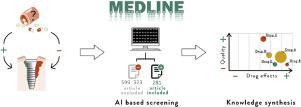Acta Biomaterialia ( IF 9.4 ) Pub Date : 2020-11-09 , DOI: 10.1016/j.actbio.2020.11.011 Mohammed Mahri , Nicole Shen , Francisco Berrizbeitia , Rania Rodan , Ammar Daer , Matthew Faigan , Doaa Taqi , Kevin Yang Wu , Motahareh Ahmadi , Maxime Ducret , Elham Emami , Faleh Tamimi

|
Clinical performance of osseointegrated implants could be compromised by the medications taken by patients. The effect of a specific medication on osseointegration can be easily investigated using traditional systematic reviews. However, assessment of all known medications requires the use of evidence mapping methods. These methods allow assessment of complex questions, but they are very resource intensive when done manually. The objective of this study was to develop a machine learning algorithm to automatically map the literature assessing the effect of medications on osseointegration. Datasets of articles classified manually were used to train a machine-learning algorithm based on Support Vector Machines. The algorithm was then validated and used to screen 599,604 articles identified with an extremely sensitive search strategy. The algorithm included 281 relevant articles that described the effect of 31 different drugs on osseointegration. This approach achieved an accuracy of 95%, and compared to manual screening, it reduced the workload by 93%. The systematic mapping revealed that the treatment outcomes of osseointegrated medical devices could be influenced by drugs affecting homeostasis, inflammation, cell proliferation and bone remodeling. The effect of all known medications on the performance of osseointegrated medical devices can be assessed using evidence mappings executed with highly accurate machine learning algorithms.
中文翻译:

骨整合药理学:使用人工智能的系统制图
患者使用的药物可能会损害骨整合植入物的临床性能。使用传统的系统评价可以轻松地研究特定药物对骨整合的影响。但是,对所有已知药物的评估都需要使用证据映射方法。这些方法可以评估复杂的问题,但是手动完成时会占用大量资源。这项研究的目的是开发一种机器学习算法,以自动映射评估药物对骨整合作用的文献。手动分类的商品数据集用于训练基于支持向量机的机器学习算法。然后对该算法进行验证,并将其用于筛选以极敏感的搜索策略识别出的599604条文章。该算法包括281条相关文章,这些文章描述了31种不同药物对骨整合的影响。这种方法的准确度达到95%,与手动筛选相比,它减少了93%的工作量。系统的映射显示,骨整合医疗设备的治疗结果可能会受到影响稳态,炎症,细胞增殖和骨骼重塑的药物的影响。可以使用通过高精度机器学习算法执行的证据映射来评估所有已知药物对骨集成医疗设备性能的影响。系统的映射显示,骨整合医疗设备的治疗结果可能会受到影响稳态,炎症,细胞增殖和骨骼重塑的药物的影响。可以使用通过高精度机器学习算法执行的证据映射来评估所有已知药物对骨集成医疗设备性能的影响。系统的映射显示,骨整合医疗设备的治疗结果可能会受到影响稳态,炎症,细胞增殖和骨骼重塑的药物的影响。可以使用通过高精度机器学习算法执行的证据映射来评估所有已知药物对骨集成医疗设备性能的影响。










































 京公网安备 11010802027423号
京公网安备 11010802027423号